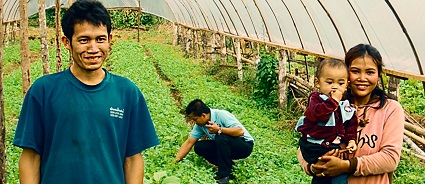Vegetable farmers in the Bolovens are reaching international markets

A project funded by the Common Fund for Commodities (CFC) and implemented by the Food and Agriculture Organization of the United Nations (FAO) is helping farmers in Bolovens to become competitive in the world market.
Pakxong district is situated in the Bolovens highlands in the south of Laos. The land in Paksong is rich and suitable for growing horticulture crops. Not surprisingly, Pakxong district is at the centre of Lao PDR’s cabbage production. Cabbages are sold through local traders both to the capital Vientiane and for export to Thailand where Bangkok is the main consumption centre.
But Boloven farmers can produce more than relatively low-value cabbage. With the growing demand for non-native and safe food in South East Asia and elsewhere and with increasing tourism in the area, opportunities for other, higher value crops, are growing. The altitude of Pakxong (> 1,000 meters) and the rest of the Bolovens provides a cool climate. Adequate rainfall which allows year round production. This gives the area a comparative advantage over the hot, and often dry, lowlands surrounding it. A range of cool climate and subtropical crops can be produced for three potential markets: the local hotel and restaurant tourist-oriented market, the Thai market with Bangkok as main centre of consumption, and the overseas Asian ethnic markets in Europe and the Middle East.
But although the potential is there, it is not always easy for the local farmers to translate this into a profitable business. The obstacles and challenges range from unfamiliarity with the new crops and with the international standards and specifications of the demanding buyers. There are also complicated export procedures to deal with, new harvesting and packaging methods and the need to finance on-farm investment such as plastic canopies, net houses, pump sets and irrigation equipment. The growing and post-harvest practices for the often speciality new crops such as coriander, Italian basil and rocket salad, are very different and more demanding than for the bulky cabbage which they are used to growing. And while cabbage can always be sold to multiple itinerant middlemen although sometimes at a loss, these new crops must be grown under contract to make sure that there is a buyer who usually also must provide certain inputs such as seed, and growing specifications.
A FAO-operated and CFC-funded project is helping farmers to deal with these challenges. “We want to establish a direct link between Lao farmers and buyers in Thailand of higher-value produce. We want farmers to be fairly treated in this cross-border trade, while improving their productivity and income” says Ms. Niran Nirannoot, the regional coordinator of the project. The project aims to connect the Bolovens vegetables producers to international markets but in the meantime it has become clear that there are also some opportunities to supply local restaurants serving Italian and French cuisine.
The project initially targeted 40 farmers in Pakxong district who used to produce low-value cabbage. The project provided them with training on land preparation, seeding techniques and pest and disease management (with support from FAO-IPM Programme and Australian Volunteer International Development Programme) to grow clean and Good Agriculture Practice (GAP) certified cabbage, iceberg lettuce, coriander, rocket salad and a number of other crops. Plastic sheet for canopies was made available so that farmers could produce delicate crops such as lettuces and coriander also during the rainy season.
FAO introduced several potential buyers from Thai companies to the farmers and facilitated the establishment of written contracts to create a responsible and mutually fair relationship between the farmers and the buyers. In close collaboration with national and provincial authorities, a two year agreement was signed with a Thai company with extensive experience on exporting certified produce and a strong sense of corporate social responsibility.
“In 2012, we made a survey in the five provinces in Boloven where cabbage farmers are located. This showed that most of them sell their cabbage at farm gate. They almost fully rely on middle-men and grow without contract. The use of contracts will help to ensure for the buyer a regular supply of good quality produce and for the farmers an assured market, a stable price and thus a stable income.” Ms. Nirannoot explained.
Some of the vegetables will reach the tables of Europe and the Middle East. “The buyer in Thailand re-exports to the EU and the Middle East. A total of 1,500 kg of coriander was exported in the four months from May to August 2014, valued at 15 million LAK, for re-export to Europe. Other crops that will be exported are chili, sugar pea, mint, tomato, eggplant, yard long bean and asparagus” commented Ms. Nirannoot. Currently exports take place once fortnightly by refrigerated pick-up truck with a capacity of 800 kg. When production volumes pick up the frequency will be increased.
The project has so far benefited 88 farmers, allowing them to have a higher and more stable income than when they grew only cabbage. The FAO-CFC project funded a small packing house that is being completed and that can be used by any current or future buyers. It will help to streamline the logistic process and allow the establishment of a supply chain directly from Pakxong to Bangkok airport without the produce having to pass through a Thai packing house. This will further help Lao farmers to become more competitive thanks to reduced post-harvest losses, reduced transport and logistic costs and improved quality and it will help to attract more buyers and exporters to Pakxong and neighboring districts.
